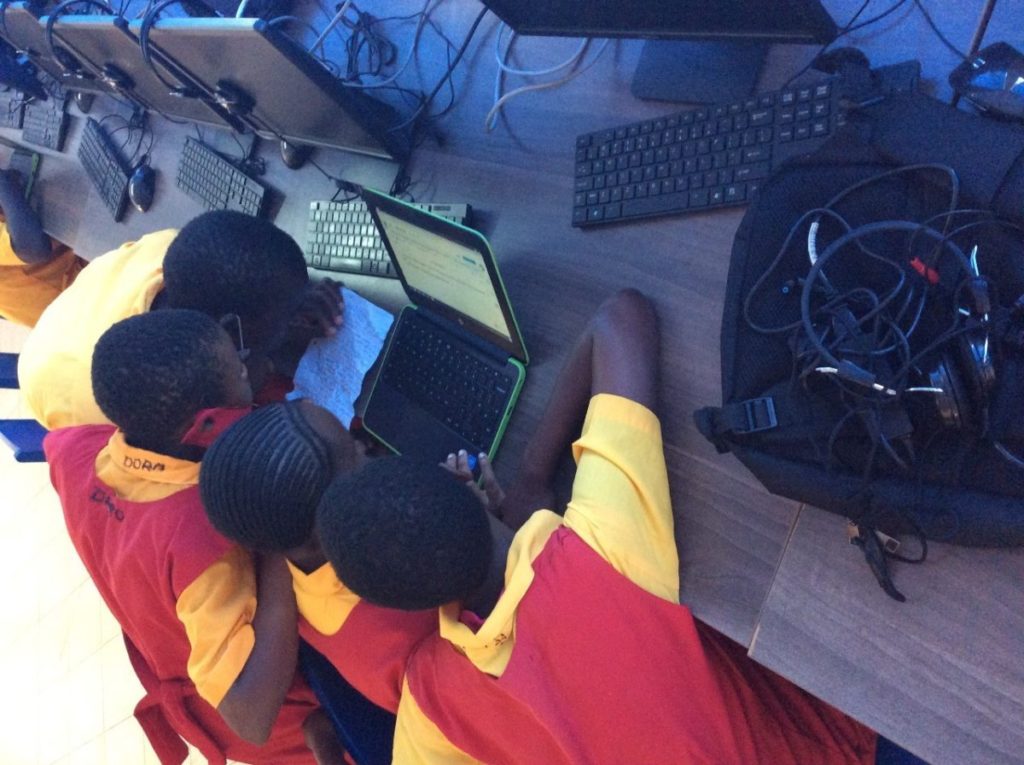Peer-to-peer learning fosters students’ growth and development
inableAdmin

Peer learning is the process by which students learn from other students, either formally or informally. In practice, inABLE has been blending peer-to-peer learning in the Computer-Labs-for-the-Blind program for nearly a decade, with fantastic results.
According to Teaching on Purpose, peer learning has been shown to be a successful venture in terms of improving students’ academic and social cognitive skills. Many students are afraid to speak up in class for fear of being judged by the teacher or their peers, or of not sounding intelligent enough. When the teacher is not present, students feel more at ease talking to one another. These strategies promote student communication and lead to increased academic success.
This relational learning experience, according to inABLE Founder and Executive Director Irene Mbari-Kirika, is a win-win situation: “Peer-to-peer learning in the Computer-Labs-for-the-Blind program has proven to be a powerful tool that not only allows students to learn from each other and champions collective problem solving, but it also helps us identify natural leaders.”
Exploiting the potential of future leaders is not only effective for learning advancement, but it is also a plentiful resource. According to United Nations statistics (2015), Africa has the world’s highest concentration of young people (aged 15 to 24), accounting for nearly 20% of the continent’s population.
According to the United Nations, Africa’s youthful population represents a significant opportunity for accelerated economic growth and innovation, whereas other world regions face an aging population. There are 226 million opportunities for great future leaders in Africa.
We have many examples of how peer mentoring has shaped future leaders and digital technology pioneers at inABLE, including:
Valerie Olesia Busaka is a third-year student at Kenyatta University studying Gender and Development Studies and a recipient of the inABLE assistive technology Labs. Valerie joined the inABLE Computer-Lab-for-the-Blind program in high school at the Nico Hauser School for the Visually Impaired after losing her sight as a teenager due to a brain tumor. Valerie gained independence and confidence as a result of the assistive Computer Labs and peer-to-peer learning, and she is now the Congressperson for Special Needs Students at Kenyatta University. She enjoys giving back to the community and is currently a volunteer at the Do It With Boldness (DIWB) organization and an Ambassador at the Gifted Community Centre.
Delvin Obara, a 20-year-old low vision high school graduate, also began advanced coding skills at the inABLE Coding for Interns program, an advanced part of the Computer-Lab-for-the-Blind project meant to equip accomplished high-school graduates with advanced computer and coding skills. Delvin had previously participated in the inABLE computer-labs-for-the-blind program and peer-to-peer learning activities at St. Lucy’s primary and high schools for three years. She is now using the assistive Labs to improve her coding skills and earn a living on her own.
Nellyjoy Gasheri, a 13-year-old class 7 student with low vision at St. Lucy Primary for the Blind, is a bright young lady who has participated in the Computer Labs for the Blind program since first grade. Her ability to master the keyboard and the fundamentals of a computer at such a young age, thanks to computer lessons over the years, led her teachers to appoint her as a champion to teach other students through a peer-to-peer learning approach.
While the prospect of youth success appears to be promising, a number of factors work against it. For example, high levels of poverty and prejudice prevent most young people in Africa, particularly those with disabilities, from pursuing an education. Aside from poverty and prejudice, a lack of access to assistive technology is a major barrier that prevents children with disabilities from accessing education and participating in the community.
Recognizing such injustices led to the establishment of the inABLE in 2009, with the goal of empowering blind and visually impaired students in Africa through assistive computer technology. inABLE has established eight assistive technology computer labs, hired and trained 15 assistive technology computer instructors, and enrolled over 14,500 blind and visually impaired students and teachers to date. Since 2013, inABLE has fostered a collaborative learning environment by incorporating peer-to-peer learning in the assistive computer Labs. As a result, girls and boys have always been treated equally and have advanced together socially and academically.
Special needs students, such as Nellyjoy, were recently forced to return home due to the Covid-19 pandemic, which resulted in widespread school closures. She was, however, one of the fortunate students to receive a Chromebook laptop as part of a home-schooling project launched by inABLE in collaboration with Kenya’s Ministry of Education and the Foreign, Commonwealth, and Development Office (FCDO). Nellyjoy advanced quickly while learning at home. She mastered the keyboard, increased her typing speed, and even virtually mentored friends. When the schools reopened, her superior computer skills led teachers to appoint her as the leader of a group of 19 students engaged in peer-to-peer learning.
According to Irene Mbari Kirika, a large part of the success of the inABLE Computer-Lab-for-the-Blind program can be attributed to peer-to-peer learning: “A more interactive and engaging learning process unfolds when our instructors step back and invite group collaboration, pushing the students to collectively advance their computer skills.”
Written by Esther Njeri Mwangi, inABLE Public Relations Officer.